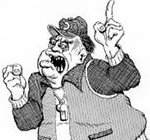 Ernest Miller Hemingway (July 21, 1899 – July 2, 1961) was an American novelist, short-story writer, and journalist.
Ernest Miller Hemingway (July 21, 1899 – July 2, 1961) was an American novelist, short-story writer, and journalist.He was part of the 1920s expatriate community in Paris, as well as the veterans of World War One later known as "the Lost Generation", as described in his posthumous memoir A Moveable Feast.
("'That's what you are. That's what you all are,' Miss Stein said. 'All of you young people who served in the war. You are a lost generation.'" Stein had overheard a garage owner use the phrase to criticize a mechanic.)
He received the Pulitzer Prize in 1953 for The Old Man and the Sea, and the Nobel Prize in Literature in 1954. Hemingway's distinctive writing style is characterized by economy and understatement, in contrast to the style of his literary rival William Faulkner.
Some say that Faulkner used all the adjectives while Hemingway used none. There is no one better than Hemingway and E.B. White to copy if you want clean, clear, evocative prose.
Novels
(1926) The Torrents of Spring
(1926) The Sun Also Rises
(1929) A Farewell to Arms
(1937) To Have and Have Not
(1940) For Whom the Bell Tolls
(1950) Across the River and Into the Trees
(1952) The Old Man and the Sea
(1970) Islands in the Stream
(1986) The Garden of Eden
(1999) True at First Light
(2005) Under Kilimanjaro
Collections
(1923) Three Stories and Ten Poems
(1925) In Our Time
(1927) Men Without Women
(1933) Winner Take Nothing
(1936) The Snows of Kilimanjaro
(1938) The Fifth Column and the First Forty-Nine Stories
(1969) The Fifth Column and Four Stories of the Spanish Civil War
(1972) The Nick Adams Stories
(1987) The Complete Short Stories of Ernest Hemingway
(1995) Everyman's Library: The Collected Stories
For my favourite excerpt from Hemingway and a discussion of Hemingway and the use of repetition, go to the Hemingway page of Writing Tips at Moore Partners.







